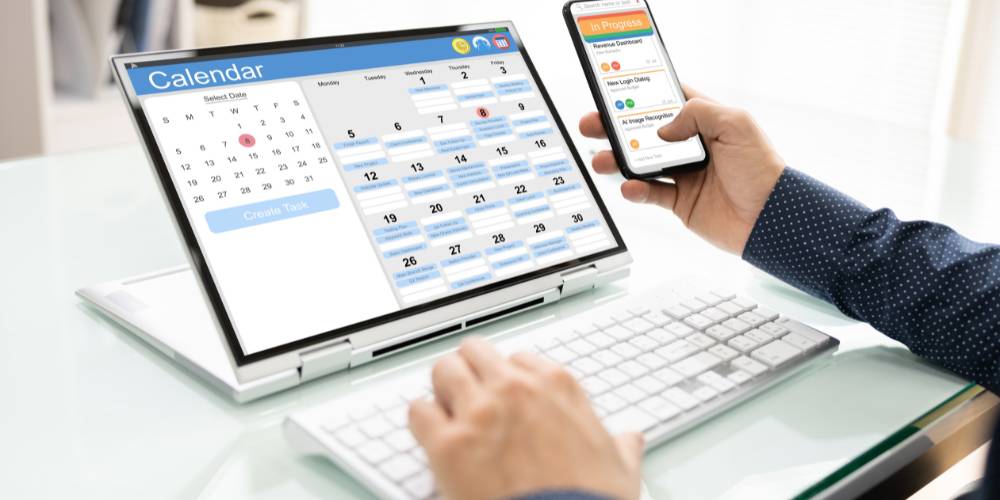

September is typically associated with back-to-school routines and seasonal transitions. A friend of mine has even dubbed it “the month to reset.” But it’s also a time to prioritize self-care.
Every September, National Self-Care Awareness Month reminds us to pause, reflect, and invest in our well-being. Although self-care may seem elusive in our hectic lives, it’s essential for maintaining a healthy balance and cultivating a positive attitude.
Let’s explore some practical strategies for incorporating self-care into your daily routine.
Physical Health: A Foundation for Self-Care
Self-care is not just about mental health. Physical health is also part of it. As such, it’s imperative to schedule regular checkups with your healthcare professional.
During these appointments, you can address any health concerns, receive required screenings, and maintain a proactive approach to your health.
Note that your routine checkup frequency depends on age, health risks, and health conditions. Although guidelines vary, the following are general recommendations:
- Ages 18-49: You should get screened every three years if you’re healthy.
- Age 50 and Older: Annually.
However, it is important for people with chronic diseases like diabetes or COPD, regardless of their age, to see their doctor frequently. Additionally, your doctor may adjust your recommended checkup schedule according to your specific risk factors, screening results, and health status.
Setting Goals: Small Steps, Big Impact
Cultivating healthy habits requires patience and consistency. Setting achievable goals aligned with your preferences is the first step. Whether walking daily, reading for 15 minutes before bed, or practicing mindfulness, small steps can make all the difference.
A journal or an app can give you a sense of accomplishment as you see your progress over time, maintaining your motivation. You may also benefit from finding a wellness buddy who can encourage you along the way. Lastly, reward yourself for reaching milestones; small rewards can boost motivation and enhance the experience.
Mindfulness: Finding Inner Peace
Finding moments of tranquility can be challenging in our fast-paced world. However, meditation and deep breathing exercises are beneficial mindfulness techniques for reducing stress and cultivating inner peace. Focusing on the present moment without judgment calms your mind and improves your overall health.
To start your day, you might consider meditating or practicing deep breathing exercises before meals. Additionally, you can take mindful walks and observe your surroundings. You can also wind down and prepare for sleep by incorporating mindfulness into your evening routine and reflecting or writing in a gratitude journal.
Prioritizing Sleep: A Vital Recharge
Many people overlook the importance of getting enough sleep. Nevertheless, it is vital for physical and mental health. As such, establish a regular sleep schedule and a relaxing bedtime routine.
Moreover, to ensure optimal rest, you should keep your sleeping environment cool, dark, and quiet. You can also create an ideal sleep environment with blackout curtains, white noise machines, or earplugs. Furthermore, a comfortable mattress and pillows can significantly improve the quality of your sleep.
Nourishing Your Body: Fuel for Well-being
To maintain energy levels and support overall health, you should fuel your body with nutritious foods. To achieve that, consume healthy food rich in fruit, vegetables, lean proteins, and whole grains. Also, throughout the day, drink plenty of water to stay hydrated.
In addition to choosing nutritious foods, practicing portion control is essential for maintaining a healthy weight. To avoid consuming excess calories, you need to be aware of serving sizes and listen to your body’s hunger cues. Using smaller plates and measuring portions can also make it easier to maintain healthy eating habits.
Regular Exercise: A Boost for Body and Mind
There’s no denying that exercising regularly will improve your physical and mental health. To stay motivated, though, keep it simple, set realistic goals, and listen to your body.
Various enjoyable physical activities include swimming, dancing, hiking, and playing sports like tennis or basketball. Additionally, you might consider taking a fitness class, such as yoga or pilates, which can be fun and beneficial. Staying active can also be as simple as taking a brisk walk in your neighborhood or exploring a nearby park.
Scheduling “Me Time:” A Necessity, Not a Luxury
In the hustle and bustle of daily life, it’s important to carve out time for yourself. As such, take part in activities that make you feel happy and relaxed for at least an hour each day. These moments of self-care can rejuvenate your mind and spirit, whether you’re reading a book, practicing a hobby, or just sipping tea.
However, it takes some planning and prioritization to balance my time with other responsibilities. It would be best to start by making a daily schedule dividing time between work, family, and personal stuff. Don’t forget to let your friends and family know what you need so your self-care time is uninterrupted.
Connecting with Nature: The Healing Power of Outdoors
Spending time outdoors has numerous benefits for physical and mental health. Connecting with nature can reduce stress, improve mood, and give you an overall sense of well-being.
You can easily incorporate nature into your daily routine by taking your morning coffee outside or taking your lunch break in a nearby park. Additionally, you could walk or bike to work if possible, or you could garden every day for a few minutes. It is even possible to feel more connected to nature by taking small actions, such as opening a window and letting in fresh air.
Giving Back: The Joy of Kindness
In addition to being helpful to yourself, acts of kindness can also profoundly impact others. For instance, you can develop a strong sense of belonging by engaging in community activities. Moreover, you can build meaningful connections, gain skills, and feel a sense of accomplishment by contributing to the greater good.
To get started, attend community events, join clubs, and participate in community projects. You can also volunteer your time, donate to a cause you care about, or simply perform small acts of kindness.
Connecting with Loved Ones: Nurturing Relationships
Maintaining strong social connections can significantly benefit mental health by reducing loneliness and depression. In addition to providing emotional comfort and practical assistance, these relationships provide a support network during challenging times. Moreover, spending time with loved ones can result in shared experiences and memories that enrich your life and create lasting joy and fulfillment.
Therefore, make time for quality interactions in person, on the phone, or on video.
Practicing Gratitude: A Daily Dose of Positivity
Practicing gratitude over time can improve your outlook on life and increase your overall happiness. Furthermore, it helps rewire the brain to notice and appreciate positive experiences more readily, increasing optimism and resilience. Additionally, practicing gratitude consistently can improve relationships by developing empathy and reducing negativity.
Get started by keeping a gratitude journal and focusing on what you are grateful for.
Saying No: Setting Boundaries
As part of self-care, saying “no” when necessary is critical. You should instead prioritize your well-being and prevent overcommitting yourself. The best way to prevent burnout is to set healthy boundaries.
You should be clear and direct about your limits without trying to justify your decision too much. To maintain positive relationships, use “I” statements to express your needs, such as, “I have a lot of work to do right now, so I can’t take on any additional tasks.” Additionally, offer alternative solutions or compromises whenever possible.
Conclusion
During National Self-Care Awareness Month, you are encouraged to prioritize your well-being and make positive changes in your life. With these strategies, you can nourish your mind, body, and soul and live a more fulfilling and balanced life.
And most importantly, realize that self-care is not selfish; it is essential for living a healthy and happy life.
FAQs
What is National Self-Care Awareness Month?
September is National Self-Care Awareness Month, which promotes physical, mental, and emotional well-being through activities that promote self-care. It reminds us that overall happiness and productivity depend on taking care of ourselves.
Why is self-care important?
It is essential to take care of yourself to be healthy and happy. The benefits include reducing stress, improving mood, increasing productivity, and enhancing relationships. The more you care for yourself, the better prepared you will be to handle life’s challenges.
What are some examples of self-care?
Self-care can come in many forms. The following are a few examples:
- Physical self-care. Maintain a healthy lifestyle through regular exercise, good nutrition, and adequate sleep.
- Mental self-care. Meditation, mindfulness, journaling, and spending time outdoors are all beneficial.
- Emotional self-care. Reaching out to loved ones, seeking support, and expressing your emotions.
- Social self-care. Setting boundaries, building strong relationships, and saying no when necessary.
- Spiritual self-care. Take part in activities that nourish your soul, such as prayer, meditation, or volunteering.
How can I incorporate self-care into my daily routine?
- Start small. Start with simple practices like taking a few deep breaths or walking briefly.
- Schedule self-care time. You should dedicate specific time to the activities you enjoy.
- Set realistic goals. Rather than making drastic changes, aim for gradual improvements.
- Be patient. Self-care is a journey, and it takes time to make progress
Is self-care selfish?
No, self-care is not selfish. In addition to being crucial to your overall well-being, it enables you to interact with others more effectively.
Image Credit: Mikhail Nilov; Pexels











Howie Jones
My name is Howie and I'm a Customer Success Manager at Calendar. I like to ensure our customers get the best experience using our product. If you have questions email me howie at calendar.com